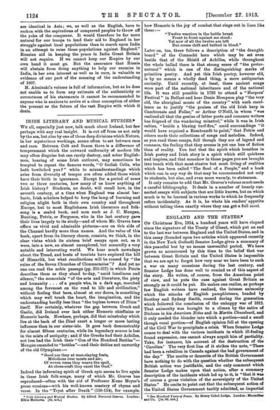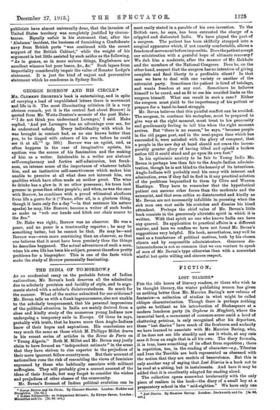ENGLAND AND THE STATES.*
ON Christmas Eve, 1914, a hundred years will have elapsed since the signature of the Treaty of Ghent, which put an end to the last war between England and the United States, and in this essay (founded upon two articles which appeared recently in the New York Outlook) Senator Lodge gives a summary of this peaceful but by no means uneventful period. We have grown so accustomed by this time to the belief that war between Great Britain and the United States is impossible that we are apt to forget how very near we have been to such a war on many occasions during the last century, and Senator Lodge has done well to remind us of this aspect of the story. He writes, of course, from the American point of view, and he puts the case against Great Britain as strongly as it could be put. He makes one realize, as perhaps few English writers have realized, the intense animosity which the attacks of English pamphleteers, headed by Southey and Sydney Smith, roused during the generation which followed the conclusion of the unhappy war of 1812. That animosity was brought to a climax by the satire of Dickens in his American Notes and in Martin Chuzzlewit, and it only needed the blunder into which a portion—and a small though vocal portion—of English opinion fell at the opening of the Civil War to precipitate a crisis. When Senator Lodge comes to deal with the various incidents in which ill-feeling found expression, one cannot always acquit him of partiality. Take, for instance, his account of the destruction of the 'Caroline.' The very first line of it strikes the note, "There had been a rebellion in Canada against the bad government of the day." The merits or demerits of the British Government have nothing to do with the question whether the subsequent British action was justifiable, and the only comment which Senator Lodge makes upon that action, after a summary description of the incidents which led up to it, is "that it was of course a gross violation of the sovereignty of the United States." He omits to point out that the subsequent action of the United States Government tacitly admitted, as impartial • One Hundred Years of Peace. By Henry Cabot Lodge. London: Macmillan and Co. [5s. Gd. net.] publicists have almost universally done, that the invasion of United States territory was completely justified by eircum- tances. Equally unfair is his statement that, after the ' Alabama' incident, the business of furnishing a Confederate navy from British ports "was continued with the covert support of the British Cabinet," while the weight of his argument is but little assisted by such asides as the following, "As in games, so in more serious things, Englishmen are excellent winners but poor losers, &c., &c." Such lapses from impartiality considerably impair the value of Senator Lodge's statement. It is just the kind of unjust and provocative statement which he condemns in Sydney Smith.



































 Previous page
Previous page